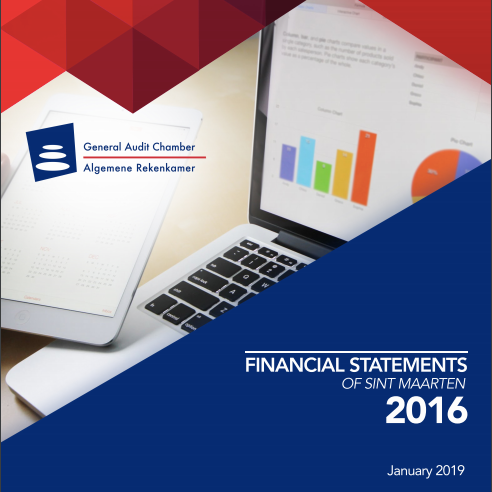Audit Chamber: “Ministries are not in control of public funds”

PHILIPSBURG – The government’s 2016 financial statements contain “material errors of profound influence,” the General Audit Chamber writes in its Compliance Audit, a document that was presented to parliament on Monday, January 14. The audit establishes that “ministries are not in control of public funds as far as public tendering is concerned” and hints in veiled terms at possible corruption.
Finance Minister Perry Geerlings – who was not in office in 2016 – acknowledged the shortcomings in a reaction to the Audit Chamber, saying that the Plan of Approach Financial Management will tackle all deficiencies and that this should lead to an unqualified opinion for the financial statements of fiscal year 2021.
The Audit Chamber notes in its report that its findings are “worrisome”, that the information provided in the 2016 financial statements is “not sound,” while substantiation of the use of public funds is “minimal”, that spending of public funds is “unlawful” and that there is a lack of accountability towards the parliament.
The government approved the 2016 financial statement more than a year late, at the end of October 2018. This makes discharge by parliament “a formality,” the Audit chamber says.
The audit revealed “substantial legal compliance errors” and established that expenditures were done while there was no budget available for it. As an example of unlawful spending the report mentions 686,000 guilders ($383,240) spent by the Ministry of General Affairs.
While the minister of finance writes in the 2016 financial statement that the informational value has improved, the Audit Chamber states that it disagrees.
One bone of contention is the way the financial statement deals with future cost-of-living-allowances. According to the Audit Chamber, this amount (121.5 million guilders, or close to $67.9 million) should be reported on the balance sheet as a financial provision. Instead it is mentioned as an “off-balance-sheet-obligation,” thus influencing the country’s true financial position.
The government accounting bureau Soab agrees with this solution but the Audit Chamber begs to differ. At the same time, the Soab issued a disclaimer of opinion about the reliability of the 2016 financial statement.
The Audit Chamber found budget overruns at the ministries totaling more than 135 million guilders ($75.4 million). Because the ministries also managed to cut expenditures, the balance is a budget overrun of 33.6 million guilders ($18.7 million). Budget overruns (minus savings on expenditures) totaled 20.2 million guilders ($11.2 million) at the Ministry of Finance, 10 million ($5.6 million) at the Ministry of Public Health, Social Development and Labor and 9.6 million ($5.3 million) at the Ministry of Tourism and Economic Affairs.
“The government does not adequately monitor legal compliance,” the audit states about financial management. “This is a serious situation. Despite good intentions and previous agreements there is a lack of improvement.”
The Audit Chamber found “inadequate control of procedures at all ministries” and furthermore notes in its report that “individual ministers failed to meet their legal obligations for providing efficient operations at the ministry under their charge.”
Among the uncertainties in the financial statement are 366 million guilders ($204 million) in tax revenue and close to 218 million guilders ($121.7 million) in personnel expenditures. The Audit Chamber’s conclusion: “The government’s financial management is not in order and has not been in order since the country’s inception on 10.10-10. We have not seen improvement.”
The Audit Chamber took a closer look at procurement – the purchase of goods, services and projects by the government – in its report and its findings are shocking.
“There are no detailed procurement regulations established by National Decree and ministries act in accordance with commonly used rules in the civil service.”
The auditors found that the Ministry of Finance does not have a registry of public tenders and that “no ministry had reliable information about tenders organized and executed in 2016.” Proposed and actual tenders are not formally documented, the audit report states.
In seventeen cases the Audit Chamber was unable to determine whether a public tender took place based on the documentation ministries provided. In eight cases of non-public tenders the required and signed proposal by the relevant minister to deviate from public tendering was missing. For seven out of eighteen invitations to tender “no justification was provided for deviation from the requirement of public tendering. Eleven times the public interest was quoted as a reason, but without further justification.”
The Audit Chamber’s conclusion: “The ministries are not in control of public funds as far as public tendering is concerned.” To which the auditors add the following remark: “There is a risk that interests, other than those of the public, may have been a determinant factor.”
###
Press release General Audit Chamber on the 2016 Financial Statements Compliance Audit report
Compliance Audit report
Op-Ed: “A sad conclusion“


























